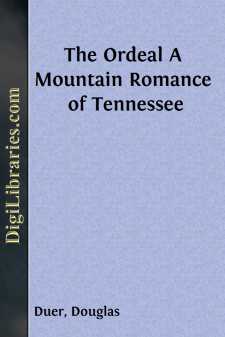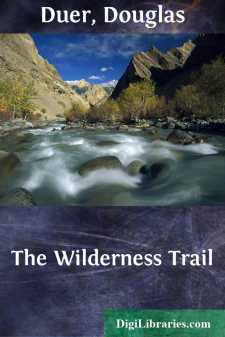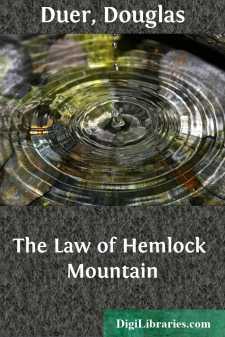Categories
- Antiques & Collectibles 13
- Architecture 36
- Art 48
- Bibles 22
- Biography & Autobiography 813
- Body, Mind & Spirit 142
- Business & Economics 28
- Children's Books 16
- Children's Fiction 13
- Computers 4
- Cooking 94
- Crafts & Hobbies 4
- Drama 346
- Education 46
- Family & Relationships 57
- Fiction 11829
- Games 19
- Gardening 17
- Health & Fitness 34
- History 1377
- House & Home 1
- Humor 147
- Juvenile Fiction 1873
- Juvenile Nonfiction 202
- Language Arts & Disciplines 88
- Law 16
- Literary Collections 686
- Literary Criticism 179
- Mathematics 13
- Medical 41
- Music 40
- Nature 179
- Non-Classifiable 1768
- Performing Arts 7
- Periodicals 1453
- Philosophy 64
- Photography 2
- Poetry 896
- Political Science 203
- Psychology 42
- Reference 154
- Religion 513
- Science 126
- Self-Help 84
- Social Science 81
- Sports & Recreation 34
- Study Aids 3
- Technology & Engineering 59
- Transportation 23
- Travel 463
- True Crime 29
The Ordeal A Mountain Romance of Tennessee
by: Douglas Duer
Description:
Excerpt
Nowhere could the idea of peace be more serenely, more majestically, expressed. The lofty purple mountains limited the horizon, and in their multitude and imposing symmetry bespoke the vast intentions of beneficent creation. The valley, glooming low, harbored all the shadows. The air was still, the sky as pellucid as crystal, and where a crag projected boldly from the forests, the growths of balsam fir extending almost to the brink, it seemed as if the myriad fibres of the summit-line of foliage might be counted, so finely drawn, so individual, was each against the azure. Below the boughs the road swept along the crest of the crag and thence curved inward, and one surveying the scene from the windows of a bungalow at no great distance could look straight beyond the point of the precipice and into the heart of the sunset, still aflare about the west.
But the realization of solitude was poignant and might well foster fear. It was too wild a country, many people said, for quasi-strangers, and the Briscoes were not justified in lingering so long at their summer cottage here in the Great Smoky Mountains after the hotel of the neighboring springs was closed for the season, and its guests and employees all vanished town-ward. Hitherto, however, the Briscoes had flouted the suggestion, protesting that this and not the spring was the "sweet o' the year." The autumn always found the fires flaring on the cosy hearths of their pretty bungalow, and they were wont to gaze entranced on the chromatic pageantry of the forests as the season waned. Presently the Indian summer would steal upon them unaware, with its wild sweet airs, the burnished glamours of its soft red sun, its dreamy, poetic, amethystine haze. Now, too, came the crowning opportunity of sylvan sport. There were deer to stalk and to course with horses, hounds, and horns; wild turkeys and mountain grouse to try the aim and tax the pedestrianism of the hunter; bears had not yet gone into winter quarters, and were mast-fed and fat; even a shot at a wolf, slyly marauding, was no infrequent incident, and Edward Briscoe thought the place in autumn an elysium for a sportsman.
He had to-day the prospect of a comrade in these delights from his own city home and of his own rank in life, despite the desertion of the big frame hotel on the bluff, but it was not the enticement of rod and gun that had brought Julian Bayne suddenly and unexpectedly to the mountains. His host and cousin, Edward Briscoe, was his co-executor in a kinsman's will, and in the settlement of the estate the policy of granting a certain power of attorney necessitated a conference more confidential than could be safely compassed by correspondence. They discussed this as they sat in the spacious reception hall, and had Bayne been less preoccupied he must have noticed at once the embarrassment, nay, the look of absolute dismay, with which Briscoe had risen to receive him, when, unannounced, he appeared in the doorway as abruptly as if he had fallen from the clouds. As it was, the brief colloquy on the business interests that had brought him hither was almost concluded before the problem of his host's manner began to intrude on Bayne's consciousness. Briscoe's broad, florid, genial countenance expressed an unaccountable disquietude; a flush had mounted to his forehead, which was elongated by his premature baldness; he was pulling nervously at his long dark mustache, which matched in tint the silky fringe of hair encircling his polished crown; his eyes, round and brown, and glossy as a chestnut, wandered inattentively. He did not contend on small points of feasibility, according to his wont—for he was of an argumentative habit of mind—in fact, his acquiescence in every detail proposed was so complete and so unexpected that Bayne, with half his urgency unsaid, came to the end of his proposition with as precipitate an effect as if he had stumbled upon it in the dark....






